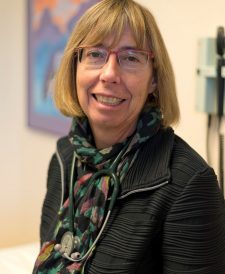By CMN Medical Director, Dr. Cathy Scrimshaw, MD, CCFP
The Challenge
I have recognized addiction and chronic pain as being a significant part of my practice since starting medicine. It has presented itself in many ways: Liver cirrhosis, secondary to alcohol or hepatitis C; trauma related injuries that over time, become chronic and painful; and more recently in overdoses and death from prescription opioids fentanyl contaminated street drugs.
It is heart breaking to experience and witness loss of young people in their prime ripple through my community, and at times I feel helpless. Similarly, is the distress of patients and families dealing with loved ones experiencing chronic pain. Mentorship has become a welcomed lifeline to me. I see the mentorship model as something of great value; a network of family physicians and specialists sharing knowledge with the goal of timely advice and better patient care.
What is the Collaborative Mentorship Network & Why Should You Join
The Collaborative Mentorship Network for Chronic Pain and Addiction (CMN) is a secure and inclusive space for members to consult with peers and grow their understanding of chronic pain and addiction. In response to the opioid crisis in Alberta, the CMN and PEER Teams have trained over 500 primary healthcare providers across the province through “Identifying and Treating OUD in Primary Care Workshops” which combines evidence-based information with first-hand experiences. It has been amazing to see how quickly family physicians have signed-up to become a part of the mentorship network. To date, we have over 50 members sharing resources, experiences, and expertise in all areas of chronic pain and addiction: tapering, deprescribing, crystal meth, alcoholism, microinduction, etc.
The recent CIHI report on substance use and hospitalization states that substance use disorders have more admissions than heart disease and stroke combined in Canada. This should be a wakeup call to all of us. Medical schools provide extensive training in the prevention and treatment of cardiovascular and cerebrovascular diseases and yet to my knowledge, there is no compulsory training in addiction in our residency programs. My own experience was simply two, two-hour lectures. I had no training on chronic pain management nor on opioid prescribing. I attended workshops and web-based training on these issues but having colleagues that I can discuss difficult and complex cases with has been the most valuable experience for me personally. Mentorship in these areas is crucial for family doctors.
I encourage you to join our compassionate and safe space, where we can discuss cases, treatment options, and better our practices. Family physicians need to be here. YOU need to be here.
How to Get Involved with the CMN
So much of the CMN is a part of our everyday practice. We are in this together, let’s start building a collaborative mentorship network today:
- Become a Mentor
- Request a Mentor
- Use the Discussion Board
- Share in Virtual Collaboration Forums
- Attend CMN Education Events
Sign-up at: www.cmnalberta.com
Join the network and share your stories. I look forward to connecting with you soon.
Cathy Scrimshaw, MD, CCFP
CMN Medical Director

